英译汉教程6_省略的翻译技巧
- 格式:ppt
- 大小:92.50 KB
- 文档页数:16
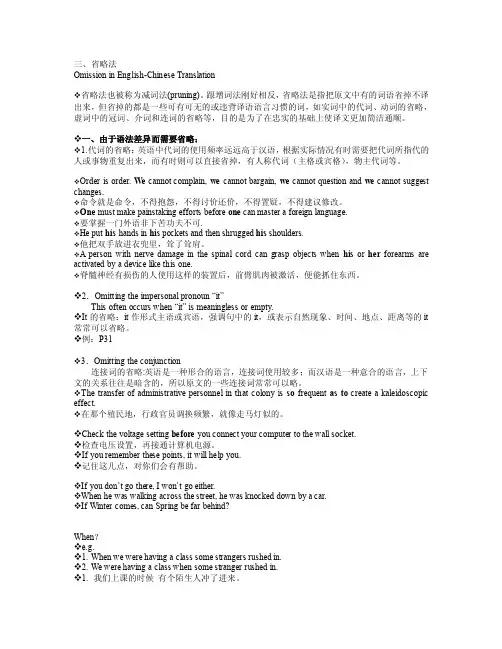
三、省略法Omission in English-Chinese Translation省略法也被称为减词法(pruning)。
跟增词法刚好相反,省略法是指把原文中有的词语省掉不译出来,但省掉的都是一些可有可无的或违背译语语言习惯的词,如实词中的代词、动词的省略,虚词中的冠词、介词和连词的省略等,目的是为了在忠实的基础上使译文更加简洁通顺。
一、由于语法差异而需要省略:1.代词的省略:英语中代词的使用频率远远高于汉语,根据实际情况有时需要把代词所指代的人或事物重复出来,而有时则可以直接省掉,有人称代词(主格或宾格),物主代词等。
Order is order. W e cannot complain, we cannot bargain, we cannot question and we cannot suggest changes.命令就是命令,不得抱怨,不得讨价还价,不得置疑,不得建议修改。
One must make painstaking efforts before one can master a foreign language.要掌握一门外语非下苦功夫不可.He put his hands in his pockets and then shrugged his shoulders.他把双手放进衣兜里,耸了耸肩。
A person with nerve damage in the spinal cord can grasp objects when his or her forearms are activated by a device like this one.脊髓神经有损伤的人使用这样的装置后,前臂肌肉被激活,便能抓住东西。
2.Omitting the imp ersonal pronoun “it”This often occurs when “it” is meaningless or empty.It的省略:it作形式主语或宾语,强调句中的it,或表示自然现象、时间、地点、距离等的it 常常可以省略。
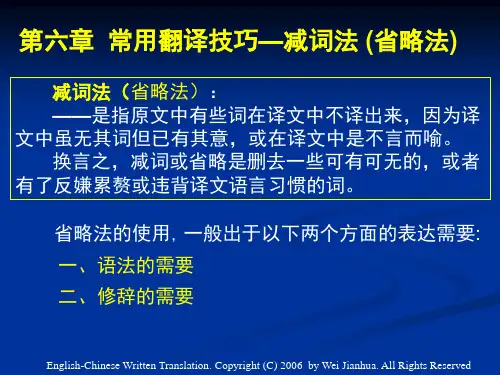
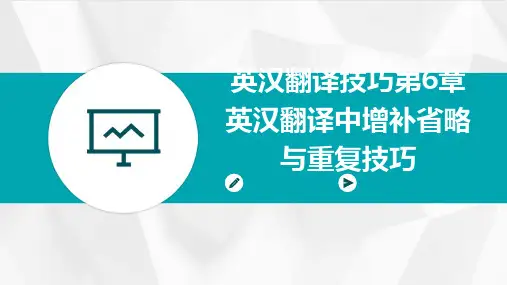

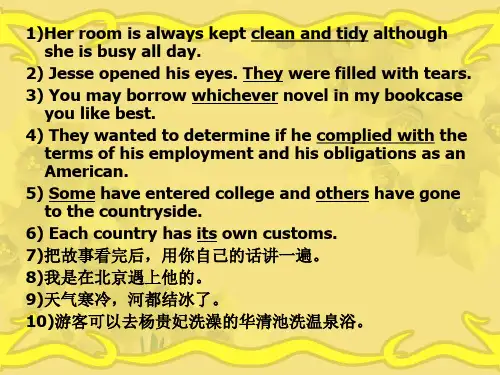
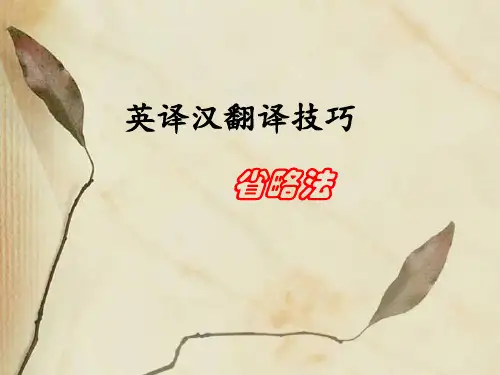

英译汉省略译法(1)—省略代词和冠词省略译法指在翻译中略去原文中需要而译文中不需要的单词和词组。
英语和汉语在某些词类的使用上有较大差异,英语里代词和连接词用得较多,而汉语里则用得较少。
英译汉时,为了使译文自然流畅,往往要避免在句子里出现代词和连接词。
A. 省略代词英语里,完整的句子(祈使句除外)都有主语。
当谓语动词是及物动词时,宾语往往必不可少,因此代词会反复出现;而汉语句子中, 前后若指的是同一人或事物,后面的主语就不再重复,宾语也经常会因为前面已提到过而省略。
所以在汉语的译文中,重复出现的代词大多可以省略。
例如:1) He never talked about himself as an object of pity, nor did he show any envy of the more fortunate or able.他从不把自己当作同情的对象,也从不对更幸运的或更能干的人表示任何嫉妒。
2) He liked to go to dances and parties, where he could have a good time just sitting and watching.他喜欢参加舞会和聚会,就是坐在一旁观看,也很开心。
3) Every afternoon when I came on duty as the evening nurse, I would walk the halls of the nursing home, pausing at each door to chat and observe.作为晚间护土,每天下午我值勤的时候,都要走过养老院的过道,在每个门口停下来看一看,聊一聊。
4) When a local baseball team found itself without a manager, he kept it going. 当本地的一支棒球队发现缺经理的时候,他使它维持下去。
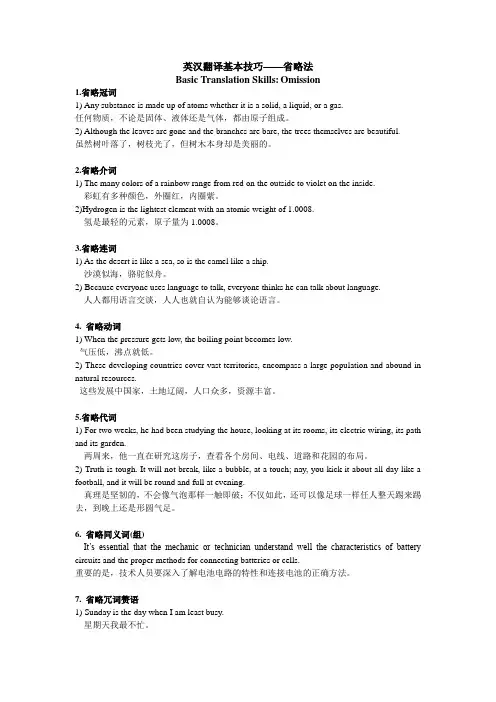
英汉翻译基本技巧——省略法Basic Translation Skills: Omission1.省略冠词1) Any substance is made up of atoms whether it is a solid, a liquid, or a gas.任何物质,不论是固体、液体还是气体,都由原子组成。
2) Although the leaves are gone and the branches are bare, the trees themselves are beautiful.虽然树叶落了,树枝光了,但树木本身却是美丽的。
2.省略介词1) The many colors of a rainbow range from red on the outside to violet on the inside.彩虹有多种颜色,外圈红,内圈紫。
2)Hydrogen is the lightest element with an atomic weight of 1.0008.氢是最轻的元素,原子量为1.0008。
3.省略连词1) As the desert is like a sea, so is the camel like a ship.沙漠似海,骆驼似舟。
2) Because everyone uses language to talk, everyone thinks he can talk about language.人人都用语言交谈,人人也就自认为能够谈论语言。
4. 省略动词1) When the pressure gets low, the boiling point becomes low.气压低,沸点就低。
2) These developing countries cover vast territories, encompass a large population and abound in natural resources.这些发展中国家,土地辽阔,人口众多,资源丰富。

笔译技巧:省略法一、从语法角度来看(一)省代词1.省略作主语的人称代词根据汉语习惯,前句出现一个主语,后句如仍为同一主语,就不必重复出现。
英语中通常每句都有主语,因此人称代词作主语往往多次出现,这种人称代词汉译时常常可以省略。
(1)省略作主语的人称代词I had many wonderful ideas, but I only put a few into practice.我有很多美妙的想法,但是只把少数付诸实践了。
He was thin and haggard and he looked miserable.他瘦弱憔悴,看上去一副可怜相。
(2)英语中,泛指人称代词作主语时,即使是作第一个主语,在汉语译文中往往也可以省略。
We live and learn.活到老,学到老。
When will he arrive?-You can never tell.他什么时候到?--说不准。
The significance of a man is not in what he attained but rather in what he longs to attain.人生的意义不在于已经获取的,而在于渴望得到什么样的东西。
2.省略作宾语的代词英语中有些作宾语的代词,不管前面是否提到过,翻译时往往可以省略。
The more he tried to hide his mistakes, the more he revealed them.他越是想要掩盖他的错误,就越是容易暴露。
Please take off the old picture and throw it away.请把那张旧画取下来扔掉。
3.省略物主代词英语句子中的物主代词出现的频率相当高。
一个句子往往会出现好几个物主代词,如果将每个物主代词都翻译出来,那么汉语译文就显得非常罗嗦。
所以在没有其他人称的物主代词出现的情况下,在翻译时物主代词大多被省略。
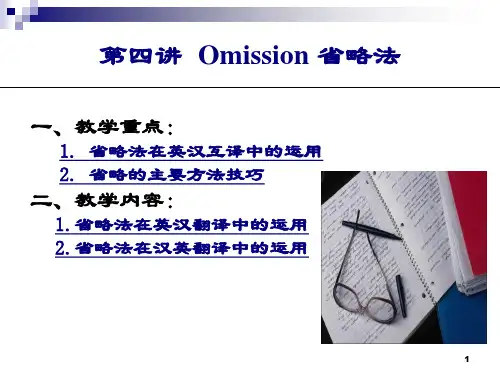
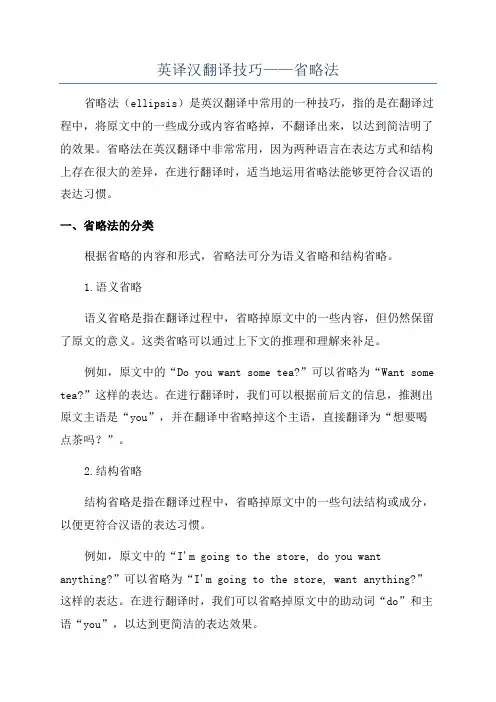
英译汉翻译技巧——省略法省略法(ellipsis)是英汉翻译中常用的一种技巧,指的是在翻译过程中,将原文中的一些成分或内容省略掉,不翻译出来,以达到简洁明了的效果。
省略法在英汉翻译中非常常用,因为两种语言在表达方式和结构上存在很大的差异,在进行翻译时,适当地运用省略法能够更符合汉语的表达习惯。
一、省略法的分类根据省略的内容和形式,省略法可分为语义省略和结构省略。
1.语义省略语义省略是指在翻译过程中,省略掉原文中的一些内容,但仍然保留了原文的意义。
这类省略可以通过上下文的推理和理解来补足。
例如,原文中的“Do you want some tea?”可以省略为“Want some tea?”这样的表达。
在进行翻译时,我们可以根据前后文的信息,推测出原文主语是“you”,并在翻译中省略掉这个主语,直接翻译为“想要喝点茶吗?”。
2.结构省略结构省略是指在翻译过程中,省略掉原文中的一些句法结构或成分,以便更符合汉语的表达习惯。
例如,原文中的“I'm going to the store, do you want anything?”可以省略为“I'm going to the store, want anything?”这样的表达。
在进行翻译时,我们可以省略掉原文中的助动词“do”和主语“you”,以达到更简洁的表达效果。
二、运用省略法的原则1.保持语意的完整性在运用省略法时,应尽量保持原文语意的完整性,避免省略导致语意不清或解释不明的情况发生。
例如,原文中的“I'm going shopping. See you later!”可以省略为“I'm going shopping. See you!”这样的表达。
虽然省略了“later”,但是通过上下文的推测,读者仍然能够理解原文的意思。
2.保持句子结构的完整性在运用省略法时,应尽量保持句子结构的完整性,避免省略导致句子结构混乱或文法错误的情况发生。